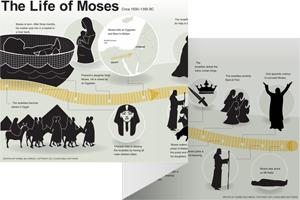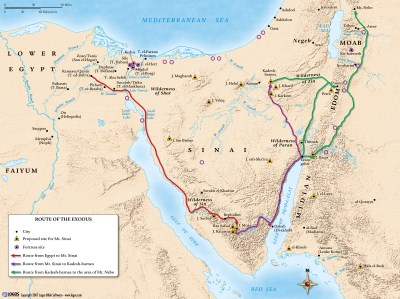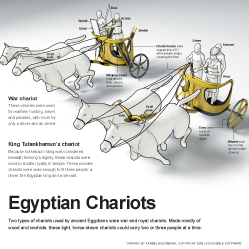14:1–31 This chapter narrates the crossing of the sea of reeds (or Red Sea; see note on Exod 13:18) and serves as a bridge between the exodus from Egypt and Israel’s time in the wilderness. Verses 30–31 summarizes Israel’s experience of Yahweh’s deliverance, His judgment of Egypt, and the people’s faith in Yahweh and His servant Moses. |
14:2 Pi-hahiroth Means “the mouth of the canal.”.
Migdol Means “tower” or “fortress.”
the sea This is the same body of water the Israelites cross to escape Pharaoh. Identifying the precise location requires knowing exactly where the Israelites were when they turned back to Pi-hahiroth (Num 33:7–8), and which direction they turned. Neither of these questions can be answered from the text; the location of the crossing is thus unknown. Compare note on Exod 13:18.
14:4 I will harden the heart of Pharaoh See note on 4:21. Yahweh moves Pharaoh to change his mind and pursue the Israelites, so that He (Yahweh) may show Himself triumphant. This decision leads to the decimation of Egypt’s army—a factor that may have prevented the Egyptians from later invading Canaan and enslaving the Israelites again.
14:9 they overtook them Likely indicates that the Egyptians and Israelites could see one another (compare Gen 31:23–25).
14:11 you have taken us to die in the desert This will not be the last time the people of Israel forget the power of God and blame Moses for their troubles. See Psa 78, which outlines this pattern.
14:14 Yahweh will fight for you The claim that God will fight on His people’s behalf, called the “divine warrior” motif, occurs throughout the Bible (e.g., Deut 28:7; Neh 4:20; Isa 42:13; Zech 14:3).
motif, occurs throughout the Bible (e.g., Deut 28:7; Neh 4:20; Isa 42:13; Zech 14:3).
14:15 Why do you cry out to me Indicates urgency: It is time to act, not to perform a lengthy prayer. This is not a denial or rebuke of faith; Moses’ words show he believes God will fight for Israel.
14:16 stretch out your hand Exodus 14:21 suggests that Moses was to stand in front of the water and hold out his staff.
dry land Refers to land that could be walked on, as opposed to land covered by water (Gen 1:9; Jonah 1:9, 13)—not parched earth. The ground could be walked on but still contained enough water that the wheels of the heavy chariots become mired in it (Exod 14:25).
14:19 the angel of God In 13:21–22, Yahweh—not the Angel of God—was going in front of Israel in a pillar of cloud or fire. The angel may be (visibly) leading the Israelites with God and now turns to block the Egyptians (v. 20). It is also possible that the angel is in the cloud and is therefore identified with Yahweh Himself.
 Angels in the Bible Table
Angels in the Bible Table
14:20 the camp of Egypt and the camp of Israel The angel and the pillar move between Egypt and the Israelites (compare v. 19). See vv. 21, 24.
dark cloud Though there is darkness with the cloud, it also lit up the night. If it were nighttime, this might describe a pillar of fire (compare 13:20–21), but it is day. Also, the pillar of fire has not been mentioned in this scene. The phrase probably indicates that the standoff began when it was day and lasted through the night. God’s east wind took all night to divide the sea (v. 21).
14:21 a strong east wind God uses a force of nature to divide the sea.
14:22 a wall The Hebrew term for “wall,” chomah, is the normal word used for the structure (e.g., 2 Sam 11:20; Ezek 40:5). The narrative provides no height dimension. While the term here may mean “barrier,” this still is not a natural posture for water (see Exod 15:8).
14:24 from in the column of Here, Yahweh is in the pillar (compare 13:20–21). There is no reference to the angel of Yahweh (see note on 3:2).
morning If the division of the sea took all night, the Israelites crossed it quickly; the Egyptians were already in the sea by morning. This suggests that the sea was not terribly large, and the assembly of Israelites was not of great size—though Exod 12:37 suggests otherwise.
14:25 he removed the wheels of their chariots See note on v. 16.
14:27 at daybreak The waters—blown apart by a wind (v. 21)—apparently took some time to return to their original state. The wind likely lost its strength gradually. Regardless of the length of time needed, the Egyptian army was lost.

|
About Faithlife Study BibleFaithlife Study Bible (FSB) is your guide to the ancient world of the Old and New Testaments, with study notes and articles that draw from a wide range of academic research. FSB helps you learn how to think about interpretation methods and issues so that you can gain a deeper understanding of the text. |
| Copyright |
Copyright 2012 Logos Bible Software. |
| Support Info | fsb |
 Loading…
Loading…




